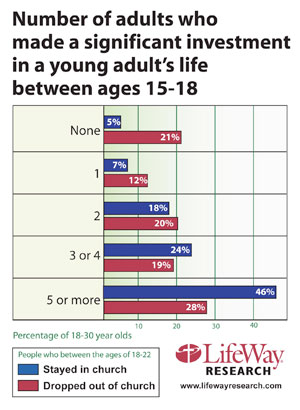Parents and churches together can help their teenagers decide to stay in church as young adults, new research from LifeWay Christian Resources indicates.

Despite appearances, teens do want guidance when it comes to the decisions they face in everyday life, and parents and churches who meet those needs make it more likely those teens will stay in church as young adults, according to a survey of more than 1,000 adults ages 18-30. LifeWay Research conducted the survey in April and May 2007.
While the study revealed that 70 percent of young adults ages 23 to 30 stopped attending church regularly for at least a year between 18 and 22, it also indicated several tangible ways parents and churches could make them more likely to stay.
Two-thirds of the teens who stay in church as young adults describe the church as “a vital part of my relationship with God” – demonstrating the importance of each teen having a vital relationship with God, as well as the importance of church attendance, said Ed Stetzer, director of LifeWay Research.
“Teens are looking for more from a youth ministry than a holding tank with pizza,” said Stetzer. “They look for a church that teaches them how to live life. As they enter young adulthood, church involvement that has made a difference in their lives gives them a powerful reason to keep attending.”
By ages 18-22, attending church has become a matter of choice – and young adults can be very pragmatic in making that choice, added Scott McConnell of LifeWay Research.
“Gone are the days in which young adults attend because they are ‘supposed to,’ ” McConnell said. “Only 10 percent of those who continued attending church did so to please others. Young adults whose faith truly became integrated into their life as teens are much more likely to stay in church. If church did not prove its value during their teen years, young adults won’t want to attend – and won’t attend.”
Teens who find their pastor’s sermons relevant to everyday life also are more likely to keep attending as young adults, the research indicated. More of those who stayed in church – by a margin of 63 to 42 percent – agreed their pastors’ sermons were relevant. A similar margin said the worship style of the church they attended as teens was appealing to them.
“Attending worship is the basic level of involvement for most who attend church at all. Many never add to or go beyond this as teens,” McConnell said. “If as teens they can’t relate to the sermons at their church or don’t enjoy the worship style, then as young adults they can easily fall away from their only connection to the church.
“While it is a constant challenge for a pastor to communicate biblical truth to multiple generations simultaneously, the importance of targeting teens with the message is clear,” McConnell added.
Teens who had at least one adult from church make a significant time investment in their lives also were more likely to keep attending church. More of those who stayed in church – by a margin of 46 to 28 percent – said five or more adults at church had invested time with them personally and spiritually.
“Investment time in young people lives out the love of Jesus Christ in a tangible way,” McConnell said. “It proves that a young person belongs at church. It can help connect the dots to help a teen integrate their faith into their life. And it gives the teen a connection to church after graduation when many of their peers are no longer around.”
Teens who, at age 17, have parents who are authentic examples of Christian faith – proactive and consistent in living out their faith – also are more likely to keep attending as young adults. Across the board, 20 percent more of those who stayed indicated they had parents or family members who discussed spiritual things, gave spiritual guidance and prayed together.
“Despite the conflicts that often occur during these years, it is difficult to understate the impact of a solid family involved in the faith community on the future involvement of teens,” Stetzer observed. “And that isn’t something that can be faked.”
“Simply attending church is a positive influence toward the teen continuing as a young adult,” he said. “However, any sign that parents have second thoughts is a negative influence. These seeds of doubt include only one parent attending, parents not agreeing on a denomination, and a gap between beliefs at church and life in the home.”
Of course, many factors in a teen’s life are beyond the control of both parents and church leaders, McConnell noted.
“Many teens have parents who are separated or divorced,” he said. “A church’s worship style won’t, and can’t, appeal to everyone.”
The study indicated other factors that make a difference in young lives – ranging from creating a welcoming environment to giving teens responsibilities at church.